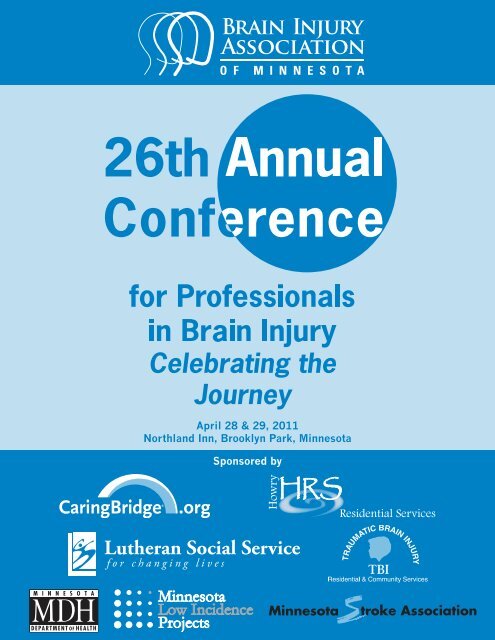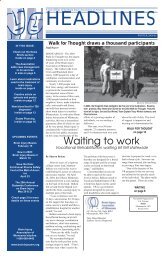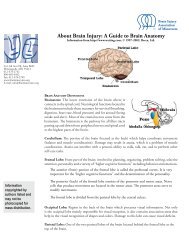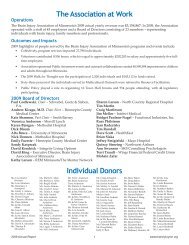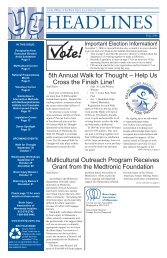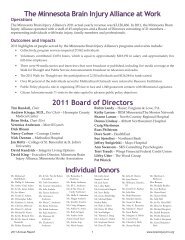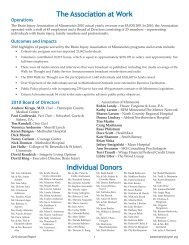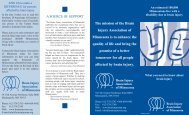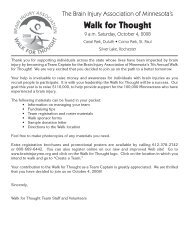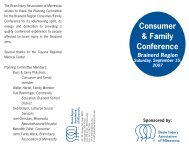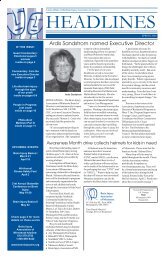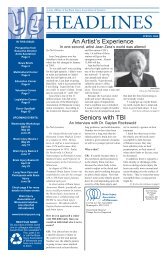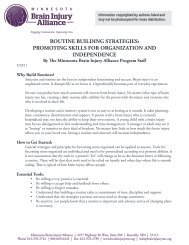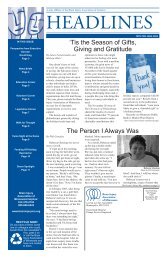our Registration Brochure (pdf) - Minnesota Brain Injury Alliance
our Registration Brochure (pdf) - Minnesota Brain Injury Alliance
our Registration Brochure (pdf) - Minnesota Brain Injury Alliance
Create successful ePaper yourself
Turn your PDF publications into a flip-book with our unique Google optimized e-Paper software.
April 28 & 29, 2011<br />
Northland Inn, Brooklyn Park, <strong>Minnesota</strong><br />
Sponsored by
Keynote Speakers<br />
Thursday Keynote Address<br />
Sexuality & Traumatic <strong>Brain</strong> <strong>Injury</strong>: Finding the Comfort Zone<br />
Tina Trudel, Ph.D.<br />
Dr. Trudel’s presentation addresses the common changes in sexual functioning<br />
and sexual satisfaction following traumatic brain injury (TBI). These changes<br />
can result in decreased quality of life for persons with TBI, and have a negative<br />
impact upon couples’ relationships and sense of self. In this session, scientific<br />
literature review, clinical guidelines and case examples will be used to engage<br />
participants regarding how to increase the comfort level in discussing sexuality<br />
with persons with TBI and their family members, how to deal with sexuality issues<br />
on rehabilitation units and in post-acute programs and how to explore and access<br />
sexual therapies, options and aides.<br />
Tina M. Trudel is President/COO of Lakeview Neurorehabilitation Centers and<br />
Specialty Hospital, a national leader in brain injury rehabilitation and neurobehavioral treatment for<br />
civilians and service members. Dr. Trudel provides oversight of Lakeview’s hospital, residential, special<br />
education and community-integrated programs nationwide. Dr. Trudel is the Principal Investigator/<br />
Site Director of the Defense and Veterans <strong>Brain</strong> <strong>Injury</strong> Center at Virginia NeuroCare and a clinical and<br />
research consultant to the Mentor ABI Network. She chairs the <strong>Brain</strong> <strong>Injury</strong> Long Term Issues Task<br />
Force of the American Congress of Rehabilitation Medicine, the Ethics Committee of the <strong>Brain</strong> <strong>Injury</strong><br />
Association of America, is a board member of the North American <strong>Brain</strong> <strong>Injury</strong> Society, a founding<br />
board member of the Blast <strong>Injury</strong> Institute, and a reviewer for the National Institute of Disability and<br />
Rehabilitation Research.<br />
Dr. Trudel is presently an Assistant Professor of Clinical Psychiatry and Neurobehavioral Sciences at<br />
the University of Virginia School of Medicine. She has numerous publications and presentations in<br />
the areas of brain injury, rehabilitation, neurodevelopmental disorders, neuropsychology, aging and<br />
neurobehavioral treatment. Dr. Trudel was the recipient of the <strong>Brain</strong> <strong>Injury</strong> Association of America’s<br />
2008 Founder’s Award for her work and advocacy in the field of brain injury rehabilitation.<br />
Friday Keynote Address<br />
Grief, Loss and Coping: How Families Survive the Emotional Trauma of <strong>Brain</strong> <strong>Injury</strong><br />
Marilyn Lash<br />
Marilyn Lash’s presentation will explore the common emotions and reactions of<br />
family members after a son or daughter, husband or wife, mother or father has a<br />
brain injury. The presentation will discuss the relevance of psychosocial models<br />
of adjustment after illness or disability for families dealing with traumatic brain<br />
injury.<br />
With over 35 years of experience working with persons with disabilities and their<br />
families in medical, rehabilitation, educational and vocational settings, her primary<br />
interests are supporting families and developing community programs. She is a<br />
founding partner of Lash and Associates Publishing/Training in Wake Forest, North Carolina. Ms.<br />
Lash is also an Assistant Clinical Professor in the Department of Physical Medicine and Rehabilitation<br />
at Tufts University School of Medicine. She is former Chairperson of the Board of Directors of the<br />
<strong>Brain</strong> <strong>Injury</strong> Association of North Carolina and the current Chair of the <strong>Brain</strong> <strong>Injury</strong> Advisory Council<br />
for North Carolina.<br />
For more information or to register online,
Thursday, 8 a.m. – 12:15 p.m.<br />
8 – 9 a.m. — <strong>Registration</strong> and Exhibits Open<br />
Exhibits are open daily 8 a.m. to 3:30 p.m.<br />
9 – 10:30 a.m. — Keynote Address<br />
Sexuality & Traumatic <strong>Brain</strong> <strong>Injury</strong>: Finding the Comfort Zone – Tina Trudel, Ph.D.<br />
10:30 – 11 a.m. — Session Break – Exhibits Open<br />
11 a.m. – 12:15 p.m. — Breakout Sessions I<br />
A. Aging with TBI<br />
Tina Trudel, Ph.D.<br />
Individuals living with brain injury often experience their injuries as adolescents and young adults, and live<br />
many years afterward. This session will review research done through the American Congress of Rehabilitation<br />
Medicine’s Long Term Outcome Task Force in the context of the literature on the topic and clinical experience. It<br />
will address recommendations for health, wellness and quality of life, along with the public policy and advocacy<br />
implications.<br />
B. <strong>Brain</strong> <strong>Injury</strong> & Seizures<br />
Timothy Feyma, MD, Gillette Children’s Speciality Healthcare; Amanda Van Wyhe, Epilepsy<br />
Foundation of <strong>Minnesota</strong><br />
Many people with brain injury also have seizures. This presentation will discuss the connection between brain<br />
injury and seizures and will also provide education about seizures, including: how to recognize a seizure, how<br />
to properly respond to a seizure, medication and treatment options for seizures. Res<strong>our</strong>ces and programs<br />
available from the Epilepsy Foundation of <strong>Minnesota</strong> will also be discussed.<br />
C. Now I Have To Go On A Sensory Diet?<br />
LeeAnn Mateffy-Horn, MS, OTR/L, CBIS, C<strong>our</strong>age Center<br />
Children, teens and adults need regular sensory-motor input for self regulation. These types of “sensory”<br />
activities help get their bodies ready to focus, pay attention, learn and participate in desired home, school, work<br />
and community activities.<br />
D. Working with and Supporting Offenders Affected by TBI and Co-occurring Disorders<br />
Lee Buckley, Reentry Services; Jeff Spies, Behavioral Health Project Manager; Joann Dillavou,<br />
MnCoSA Director, <strong>Minnesota</strong> Department of Corrections<br />
This workshop will discuss practices and processes used in the <strong>Minnesota</strong> Correctional Facilities to support<br />
offenders affected by traumatic brain injury and co-occurring disorders. It will also discuss planning for their<br />
re-entry back to the community upon their release from prison.<br />
E. A Primer on Executive Functions<br />
Jonathon Miller Ph.D., LP, ABPP, Children’s Hospitals and Clinics of <strong>Minnesota</strong><br />
This presentation will describe the development of the Executive Function system; its importance for the<br />
development of independent learning; conditions that impact the development of Executive Functions, and<br />
strategies and interventions for teaching children with Executive Dysfunction.<br />
F. <strong>Minnesota</strong>’s Aging <strong>Brain</strong>: Who? Where? How Many? For How Long?<br />
Mark Kinde, <strong>Minnesota</strong> Department of Health<br />
What causes most brain injuries in <strong>Minnesota</strong>? Where in <strong>our</strong> state do the injuries occur? How long do the<br />
sequalae last? What can we do about it? Come explore the interactive, queriable data and find out about brain<br />
injury in y<strong>our</strong> favorite county.<br />
please visit www.braininjurymn.org/conference.html
Thursday, 12:15 – 2:30 p.m.<br />
12:15 – 1:15 p.m. — Lunch<br />
1:15 – 2:30 p.m. — Breakout Session II<br />
A. Addressing Grief and Loss After Acquired <strong>Brain</strong> <strong>Injury</strong><br />
Robert Karol, Ph.D., LP, ABPP, CBIST, Karol Neuropsychological Services & Consulting<br />
This presentation will address grief and loss after brain injury. It will highlight living with a chronic condition<br />
compared to acute/terminal ones. The process/roles in brain injury treatment and their implications for grief<br />
and loss intervention will be covered. Re-conceptualizing acceptance/adjustment to disability will be addressed.<br />
Suggestions will be provided for treatment.<br />
B. Adapting Yoga for Veterans with <strong>Brain</strong> <strong>Injury</strong><br />
Amy Moran, MA, RYT; Casey Linstad, CTRS; Rose Collins, Ph.D., LP, Minneapolis VA Healthcare<br />
System<br />
The National Center for Complementary and Alternative Medicine (NCCAM) identifies yoga as a mind-body<br />
practice that uses breathing exercises, movement, and relaxation to both address specific health conditions and<br />
promote general well being. This presentation highlights some of the considerations associated with adapting<br />
yoga practice for veterans with brain injury.<br />
C. PASS and Work Incentives<br />
Nellie Adrover, Social Security Administration<br />
A PASS allows the individual to set aside other income besides the SSI and/or res<strong>our</strong>ces for a specified period<br />
of time to achieve a work goal. Work incentives are employment supports available to SSI and SSDI recipients.<br />
D. Resuscitating the Injured <strong>Brain</strong>—The First H<strong>our</strong>s<br />
Mustapha Ezzeddine, MD, University of <strong>Minnesota</strong>, Hennepin County Medical Center<br />
Many brain injuries are acute and can be influenced by emergent therapies. This talk will explain in a concise<br />
and clear manner the basic principles behind acute brain resuscitation, with emphasis on Traumatic <strong>Brain</strong><br />
<strong>Injury</strong>, acute ischemic strokes, and acute hemorrhagic strokes.<br />
E. The Role of the Ombudsman In Navigating Complex Service Systems<br />
Roberta Opheim, Ombudsman for Mental Health and Developmental Disabilities<br />
An Ombudsman is referred to very differently in different systems. One term frequently used is that of “watchdog”<br />
of a system. This presentation will provide information on the role of the Ombudsman for Mental Health<br />
in <strong>Minnesota</strong>, what issues they can look into, where do brain injuries fit and what happens with the information<br />
once the Ombudsman reviews a complaint.<br />
F. Absence/Presence, Part I<br />
Jed Schlegelmilch<br />
Part I of a two-part session. Absence/Presence is an official Flyway Film Festival and Oneota Film Festival<br />
selected documentary that deals with loss, life, depression,grief, suicide prevention, family and strength. It’s<br />
time to talk about the unspeakable and to understand the unexplainable. Time to look back to move forward.<br />
Sometimes the j<strong>our</strong>ney to a happy ending means treading through the sorrows of the past. Join a man as he<br />
spends 10 days revisiting an unimaginable horror from his childhood for the first time. Nearly 17 years after<br />
his brother’s death, Absence/Presence is the truly raw, emotional and ultimately life affirming experience that<br />
comes from finding the c<strong>our</strong>age to stare into the depth of the devastating event of y<strong>our</strong> life and still ache to<br />
know more.<br />
For more information or to register online,
Thursday, 2:30 – 4:15 p.m.<br />
2:30 – 3 p.m. — Session Break – Exhibits Open<br />
3 – 4:15 p.m. — Breakout Session III<br />
A. Regaining Calm: Implementing Simple De-escalation Techniques<br />
Kathy Nesheim-Larson, MSW, CBIT, Director of <strong>Brain</strong> <strong>Injury</strong> Services REM-<strong>Minnesota</strong>; Ben<br />
Woodworth, MSW, Iowa Association of Community Providers<br />
Emotional and behavioral dyscontrol are well known to be challenging sequelae of brain injury. This session will<br />
present simple de-escalation techniques in a way that professionals can identify potentially valuable interactional<br />
skills in a non-technical way. Professionals who can respond without hesitation to situations of impending<br />
behavior upset feel more competent, enjoy better job satisfaction and avert potentially unsafe situations. This<br />
presentation will provide some very straightforward and uncomplicated ways to assist people when they are<br />
in the midst of emotional upset and get them to act differently in the future, while removing some of the<br />
discomfort and possible risks that are present for everyone at the disconcerting moment of their distress.<br />
B. Where Have We Been . . . Where Are We Going?<br />
Alex Bartolic, Director of Disability Services, <strong>Minnesota</strong> Department of Human Services<br />
Services for individuals with brain injuries and other disabilities is at a crossroads. With a history of<br />
deinstitutionalization, we face challenges of sustainability, equity, and quality in home and community based<br />
services. Learn about the history of home and community based services in <strong>Minnesota</strong>, the current status, and<br />
strategies underway or under consideration for the future of <strong>Minnesota</strong>’s publicly funded services for people<br />
with disabilities.<br />
C. Using Social Networks to Improve Patient Care<br />
Sona Mehring, CaringBridge<br />
Social networks can be leveraged to improve a patient’s quality of life by keeping them connected to family and<br />
friends. CaringBridge was created specifically to help people facing a health challenge communicate with their<br />
family and friends, making each health j<strong>our</strong>ney easier. Learn how CaringBridge can help y<strong>our</strong> patients.<br />
D. Evaluation and Treatment of Persons with Post Concussion Syndrome<br />
Amy Garrigues, PT, DPT; John Groves, PT, DPT, Groves Physical Therapy<br />
Symptoms of Post Concussive Syndrome (PCS) presents many challenges to the patients that suffer them, their<br />
families and health care providers. Learn current concepts in the theories for the presence and continuation of<br />
these symptoms as well as evidence based evaluation and treatment of persons with PCS.<br />
E. From Adolescence to Adult Independence: A TBI Survivor’s J<strong>our</strong>ney<br />
Jennifer Galvin, Survivor, Living Well Energy Healing/Galvin Rehabilitation Services; Craig<br />
Galvin, Galvin Rehabilitation Services<br />
Craig Galvin is a Qualified Rehabilitation Counselor and father of a TBI survivor who will share both his knowledge<br />
of TBI Case Management and their personal story. Jennifer will share her perspective of TBI rehabilitation in the<br />
past 15 years, from graduating high school to attending college and graduate school, in addition to achieving<br />
employment and independent living.<br />
F. Absence/Presence, Part II<br />
Jed Schlegelmilch<br />
Part II of a two-part presentation. Absence/Presence is an official an official Flyway Film Festival and Oneota<br />
Film Festival selected documentary that deals with loss, life, depression,grief, suicide prevention, family and<br />
strength. It’s time to talk about the unspeakable, understand the unexplainable. Time to look back to move<br />
forward. Sometimes the j<strong>our</strong>ney to a happy ending means treading through the sorrows of the past. Join a man<br />
as he spends 10 days revisiting an unimaginable horror from his childhood for the first time. Nearly 17 years<br />
after his brother’s death, Absence/Presence is the truly raw, emotional and ultimately life affirming experience<br />
that comes from finding the c<strong>our</strong>age to stare into the depth of the devastating event of y<strong>our</strong> life and still ache<br />
to know more.<br />
please visit www.braininjurymn.org/conference.html
Friday, 8 a.m. – 12:15 p.m.<br />
8 – 9 a.m. — <strong>Registration</strong> and Exhibits Open<br />
Exhibits are open daily 8 a.m. to 3:30 p.m.<br />
9 – 10:30 a.m. — Keynote Address<br />
Grief, Loss and Coping: How Families Survive the Emotional Trauma of <strong>Brain</strong> <strong>Injury</strong> -<br />
Marilyn Lash<br />
10:30 – 11 a.m. — Session Break – Exhibits Open<br />
11 a.m. – 12:15 p.m. — Breakout Session I<br />
A. When a Parent has a <strong>Brain</strong> <strong>Injury</strong>, Blast <strong>Injury</strong> or PTSD: Helping Sons and Daughters<br />
Marilyn Lash, Lash and Associates<br />
Differences and commonalities among children whose parents have civilian and service connected brain injuries<br />
will be explored. Strategies to address and lessen the anxieties and fears of children of all ages will be presented<br />
to help parents and clinicians provide emotional support, foster communication, and build coping skills.<br />
B. The Vicious Cycle: Strategies for Mental Health After <strong>Brain</strong> <strong>Injury</strong><br />
April Sjulstad, MS, CPRP; Jodi Greenstein, MSW, LICSW, CBIS; Sonja Kruse, MA, CBIS;<br />
Melissa Loveday, BA, C<strong>our</strong>age Center<br />
Individuals who have a brain injury have a high risk of cognitive, emotional, and behavioral problems that<br />
constitute a major s<strong>our</strong>ce of stress and disability. Anxiety and TBI is among the most common co-occurrences.<br />
Furthermore, there appears to be a repetitious and circular pattern that individuals struggle with, in which<br />
anxiety is exacerbated by worry and TBI related symptoms and vice versa. This session will present strategies for<br />
relaxation, anxiety reduction, behavioral and environmental modification to help alleviate or prevent symptoms<br />
that are well suited to the needs of individuals with TBI. An advantage to these interventions is that given their<br />
structured content, they are adapted for memory, attention, and problem solving. This is a panel discussion,<br />
including staff from C<strong>our</strong>age Center’s ARMHS program and Behavioral Services and a consumer.<br />
C. Surviving <strong>Brain</strong> <strong>Injury</strong><br />
Bridgid Ruden, ARNP<br />
As a nurse practitioner who suffered a traumatic brain injury in 2008, Bridgid will be sharing her story with<br />
professionals, survivors and families regarding the impact that brain injury rehabilitation has had on her and<br />
what she has done to heal.<br />
D. Sleep and Acquired <strong>Brain</strong> Injuries<br />
John Garcia, MD, Gillette Children’s Specialty Healthcare<br />
Participants will be able to identify typical sleep disorders associated with acquired brain injuries, become<br />
familiar with incidence, physiology, clinical history taking, diagnostic tools and treatments used in patients<br />
with sleep disorders associated with acquired brain injuries. Additionally, attendees will become aware of some<br />
simple, yet effective suggested clinical tools.<br />
E. Wide World of External Memory Aids: Practical Decision-Making Strategies<br />
Donald MacLennan MA CCC/SLP, Minneapolis VA Healthcare System<br />
Assistive technology for rehabilitation has been described as one of the most exciting recent developments in<br />
cognitive rehabilitation (Wilson 2009). However, recent reviews suggest the evidence-base in this area is limited<br />
(Sohlberg 2007). This presentation will review current evidence and decision-making strategies involved in<br />
providing assistive technology interventions for persons with memory impairment.<br />
F. Diagnosis to Secondary Prevention: Modern Evaluation of Stroke, Its Management and<br />
Prevention<br />
Ronald Tarrel, DO, Noran Neurological Clinic and Abbott Northwestern Hospital; Medical<br />
Director of Stroke Services Program, Neurocritical Care Unit, Allina Stroke Program<br />
Committee<br />
This presentation will review the current clinical approach to ischemic stroke. Topics to be discussed will include<br />
acute detection and emergent treatment strategies, brief review of the risk factors, prevention measures after<br />
a stroke and current directions in clinical research.<br />
For more information or to register online,
Friday, 12:15 – 2:30 p.m.<br />
12:15 – 1:15 p.m. — Lunch<br />
1:15 – 2:30 p.m. — Breakout Session II<br />
A. Understanding and Using Neuropsychological Evaluations<br />
Robert Karol, Ph.D., LP, ABPP, CBIST, Karol Neuropsychological Services & Consulting<br />
This session will explain the process of neuropsychological evaluations, the use of norms, the type of information<br />
obtained and how professionals can apply this information.<br />
B. Exploring a Mind-Body Approach for <strong>Brain</strong> <strong>Injury</strong><br />
Amy Samson-Burke, PT, Yoga Instructor, Mind Body Solutions<br />
Drawing upon experience as both a physical therapist and yoga teacher, Amy discusses the application of a<br />
mind-body approach to brain injury. Amy’s presentation includes the exploration of mind-body strategies and<br />
examples of functional improvements in clients. Comfortable clothing is recommended.<br />
C. Aphasia Therapy: Then, Now, and Beyond<br />
Cynthia Busch, Ph.D., CCC, Speech Language Pathologist, <strong>Minnesota</strong> State University Mankato,<br />
<strong>Minnesota</strong> Stroke Association<br />
This session will provide basic background about stroke, aphasia, and how aphasia therapy has moved from<br />
the medical to the social model. Everything about what we do (when, how, how long, with whom, where, and<br />
why) has drastically changed in the last f<strong>our</strong> decades. The <strong>Minnesota</strong> Stroke Association Aphasia Conversation<br />
Groups will be described as an example of this paradigm shift in aphasia intervention.<br />
D. Legislative Session Update<br />
Jeff Nachbar, <strong>Brain</strong> <strong>Injury</strong> Association of <strong>Minnesota</strong><br />
This session will provide an update and information on the 2011 legislative session as it pertains to the status<br />
of the Association’s advocacy efforts. Key topics will include the current status of health and human service<br />
funding in the state budget, including progress on brain injury prevention and special education. Other topics<br />
currently under consideration by legislators at the State Capitol will also be highlighted.<br />
E. Visual Deficits After <strong>Brain</strong> <strong>Injury</strong><br />
Marilyn Haight, OT; Nova McNally, OT, Hennepin County Medical Center<br />
Many people with a <strong>Brain</strong> <strong>Injury</strong> have more difficulty with visual tasks: reading, driving, computers and more.<br />
An eye exam may indicate “everything is fine,” but deficits persist. Understanding the cause, the symptoms and<br />
basic compensation techniques is a first step in helping.<br />
F. <strong>Brain</strong> <strong>Injury</strong> and Domestic Violence<br />
Jan Williams, Tubman<br />
Lean about an innovative project between Tubman, a provider of domestic violence services, and the <strong>Brain</strong><br />
<strong>Injury</strong> Association of <strong>Minnesota</strong>. These agencies are developing a national model to provide services, programs,<br />
and information to individuals at the intersection of domestic violence and brain injury that will enhance lives<br />
and help individuals reach their full potential within their communities.<br />
please visit www.braininjurymn.org/conference.html
Friday, 2:30 – 4 p.m.<br />
2:30 – 2:45 p.m. — Session Break – Exhibits Open<br />
2:45 – 4 p.m. — Plenary Session – A Mind-Body Approach to Maximizing Long-Term Outcomes<br />
Matthew Sanford<br />
Minds and bodies work better together. Drawing upon his<br />
inspirational story of 32 years of paralysis and nearly twenty<br />
years of yoga, Matthew explores the underlying nature of disability<br />
and how a mind-body approach maximizes long-term outcomes<br />
for both patients and caregivers alike. Participants will also gain<br />
insight into their own mind-body relationship and the importance<br />
of self-care.
Supporters and Additional Information<br />
Thank you to <strong>our</strong> Diamond Supporters:<br />
Annual Conference<br />
Partners<br />
<strong>Minnesota</strong> Department<br />
of Health<br />
<strong>Minnesota</strong> Low<br />
Incidence Projects<br />
<strong>Minnesota</strong> Stroke<br />
Association<br />
<br />
Supporters as of<br />
March 2, 2011<br />
Diamond Level<br />
CaringBridge<br />
Howry Residential<br />
Services<br />
Lutheran Social<br />
Services<br />
TBI Residential<br />
& Community<br />
Services/Pathways<br />
to Achievement<br />
<br />
For Y<strong>our</strong> Comfort<br />
Please be responsible for y<strong>our</strong> own comfort during the conference. Layering is<br />
recommended given the temperature ranges of large conference center settings.<br />
Additional Information<br />
Video or audio taping during the conference requires pre-approval by the <strong>Brain</strong><br />
<strong>Injury</strong> Association of <strong>Minnesota</strong>. If you have questions please call 612-378-2742<br />
or 800-669-6442.<br />
If you require a reasonable accommodation to access this conference please<br />
contact the <strong>Brain</strong> <strong>Injury</strong> Association of <strong>Minnesota</strong> by April 6, 2011 and specify<br />
y<strong>our</strong> needs.<br />
Parking is available at the Northland Inn.<br />
Lodging<br />
Blocks of rooms have been arranged at the Northland Inn. Registrants are<br />
responsible for their own hotel arrangements. Please mention the <strong>Brain</strong> <strong>Injury</strong><br />
Association of <strong>Minnesota</strong> when reserving y<strong>our</strong> room.<br />
Northland Inn<br />
7025 Northland Drive<br />
Brooklyn Park, MN 55428<br />
800-441-6422<br />
You can also make y<strong>our</strong> hotel reservations online at these group rates by going<br />
to www.braininjurymn.org/hotel.html.<br />
Gold Level<br />
Gillette Children’s<br />
Hospital<br />
Hennepin County<br />
Medical Center<br />
Lash & Associates<br />
Lakeview<br />
Neurorehabilitation<br />
Centers and<br />
Specialty Hospital<br />
Vinland National Center<br />
<br />
Silver Level<br />
Hellmuth & Johnson<br />
Mayo Clinic<br />
REM <strong>Minnesota</strong><br />
<br />
Bronze Level<br />
ACR Healthcare Group<br />
Beyond Barriers<br />
Christensen Group<br />
Grand Itasca Clinic &<br />
Hospital<br />
Integrity Living Options<br />
Kauffman Law Firm<br />
Rise, Inc.<br />
Schwebel Goetz &<br />
Sieben<br />
If you have any questions, please contact the <strong>Brain</strong> <strong>Injury</strong> Association of<br />
<strong>Minnesota</strong>’s Education department by calling 612-378-2742 or 800-669-6442.
Conference Overview<br />
The conference is designed for physicians, psychologists, rehabilitation therapists, social workers,<br />
case managers, nurses, educators, special education directors/administrators, mental health and<br />
chemical health therapists, residential staff, policy makers, state agency personnel, as well as<br />
program administrators. All interested professionals who serve individuals living with brain injury are<br />
welcome to attend.<br />
The <strong>Brain</strong> <strong>Injury</strong> Association of <strong>Minnesota</strong> partners with the <strong>Minnesota</strong> Department of Education to<br />
provide continuing education breakout sessions for educators during selected breakout sessions of<br />
this conference.<br />
The purpose of this two-day professional conference is to highlight<br />
new research, trends, practice strategies and collaborative models<br />
of care. Innovative approaches and new systems of care for<br />
individuals sustaining and living with brain injury will be presented<br />
through discussion, lecture, case studies and exhibits.<br />
The <strong>Brain</strong> <strong>Injury</strong> Association of <strong>Minnesota</strong> is accredited through<br />
the <strong>Minnesota</strong> Department of Health for CEU credits for nursing,<br />
physical therapy, occupational therapy and speech language<br />
therapy. The Association has submitted for CRCC, CCMC and<br />
CCMSC credits and is an approved Continuing Education Provider<br />
for <strong>Minnesota</strong> Board of Social<br />
Work and the <strong>Minnesota</strong> Board<br />
of Examiners for Nursing Home Administrators.<br />
The mission of the <strong>Brain</strong> <strong>Injury</strong> Association of <strong>Minnesota</strong> is<br />
to enhance the quality of life and bring the promise of a better<br />
tomorrow for all people affected by brain injury.
<strong>Registration</strong> Information<br />
To register for the 26th Annual Conference for Professionals in <strong>Brain</strong> <strong>Injury</strong>, please fill out the form below as<br />
you would like it to appear on y<strong>our</strong> name tag. Use one form per person. Each attendee must be registered – no<br />
sharing of registration, please. Send completed forms to:<br />
<strong>Brain</strong> <strong>Injury</strong> Association of <strong>Minnesota</strong><br />
34 13th Avenue NE, Suite B001<br />
Minneapolis, MN 55413<br />
You may also fax y<strong>our</strong> registration to 612-378-2789, or register online at www.braininjurymn.org.<br />
Participant * <br />
Occupation <br />
Organization * <br />
Phone <br />
Preferred Mailing Address<br />
Address: <br />
Address: <br />
City State Zip <br />
Billing Address<br />
(if paying by credit card, this address must match with y<strong>our</strong> credit card billing address)<br />
E-mail <br />
Address: <br />
Address: <br />
* As you would like it to appear on y<strong>our</strong> name tag<br />
City State Zip <br />
Please check the sessions you would like to attend (choose one class per session).<br />
Thursday, April 28<br />
11 a.m. – 12:15 p.m. – Breakout Session I<br />
Friday, April 29<br />
11 a.m. – 12:15 p.m. – Breakout Session I<br />
A B C D E F<br />
A B C D E F<br />
1:15 – 2:30 p.m. – Breakout Session II<br />
A B C D E F<br />
3:15 – 4:30 p.m. – Breakout Session III<br />
A B C D E F<br />
1:15 – 2:30 p.m. – Breakout Session II<br />
A B C D E F<br />
2:45 – 4 p.m. – Plenary Session<br />
Closing session with Matthew Sanford<br />
Payment Information<br />
Cancellations received less than 15 days before the conference are subject to a 20% fee.<br />
<strong>Registration</strong> ends on April 22, 2011<br />
$150, 1 day (member) $175, 1 day (nonmember)<br />
$220, 2 days (member) $250, 2 days (nonmember)<br />
One additional conference registration is available for exhibitors for $70 per day<br />
$70, Thursday additional exhibitor $70, Friday additional exhibitor<br />
Group rates are available for groups of five (5) or more. Please contact the <strong>Brain</strong> <strong>Injury</strong> Association of <strong>Minnesota</strong> to register<br />
at group rates.<br />
TBI Educator Voucher Recipient<br />
Special education teachers and school TBI specialists may apply for a TBI Educator Conference Voucher<br />
(which will cover a significant portion of the conference registration cost) by contacting Deb Williamson,<br />
Statewide Education TBI Specialist at Deb.Williamson@metroecsu.org.<br />
Check enclosed Invoice me Total Enclosed $<br />
VISA MasterCard Credit Card Number: <br />
Name on Card:<br />
Signature of Card Holder: <br />
Expiration Date: <br />
Special accommodations: <br />
If you require a reasonable accommodation to access this conference, please inform us by April 6, 2011 and specify y<strong>our</strong> needs.
<strong>Registration</strong><br />
Materials<br />
Enclosed<br />
34 13th Avenue NE, Suite B001<br />
Minneapolis, MN 55413<br />
Phone: 612-378-2742 • 800-669-6442<br />
Fax: 612-378-2789<br />
Web: www.braininjurymn.org<br />
E-mail: info@braininjurymn.org


